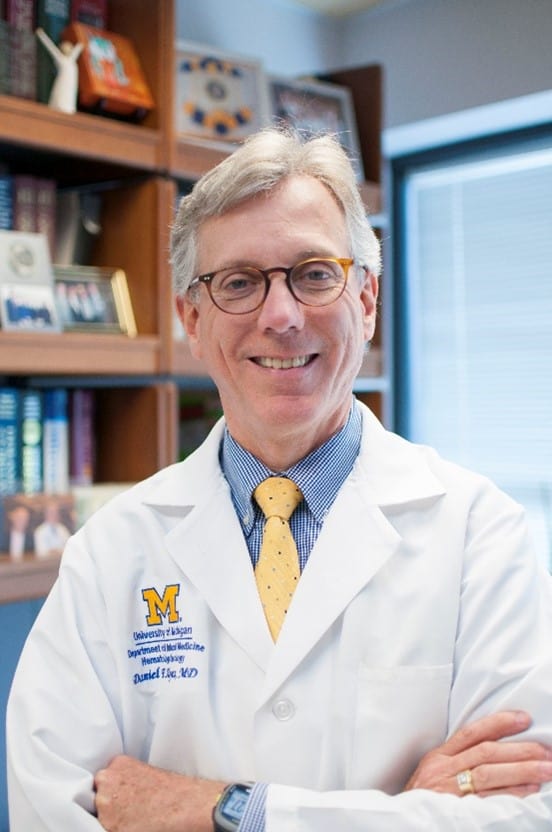
Komen Scholar alum Daniel F. Hayes, M.D., FACP, FASCO, is world-renowned for his groundbreaking discoveries in breast cancer research and his thought leadership in improving diagnostic testing. But at the heart of his work is the question, what is best for the patient?
Dr. Hayes is receiving the 2023 Brinker Award for Scientific Distinction in Clinical Research for his innovative work in tumor biomarker research, particularly for the development of biomarker tests used to guide treatment decisions for patients. Dr. Hayes is the Stuart B. Padnos professor of breast cancer research at the University of Michigan Rogel Cancer Center and professor of internal medicine, Division of Hematology Oncology at the University of Michigan Medical School.
While he did not originally plan for a career in breast cancer, Dr. Hayes credits his early mentors for inspiring his career path. At Indiana University, he trained under Dr. Larry Einhorn, who successfully developed a treatment for testicular cancer. From there, Dr. Hayes moved on to continue his studies in oncology at Dana-Farber Cancer Institute.
“I got assigned to a lab, kind of against my will,” he says. “My mentor had this one little niche in the lab of breast cancer, and he asked me, ‘Why don’t you take that over?’ I did, and that is how I found the circulating tumor marker for breast cancer that’s widely used now, called CA15-3.”
Dr. Hayes’ discovery of CA15-3 led to the development of a diagnostic test that could identify the presence of this tumor biomarker in the blood, which is used around the world today to monitor patients with metastatic breast cancer (MBC).
With support from Komen, Dr. Hayes and his team sought new, innovative ways to extract tumor cells from circulating blood, using devices that can continuously capture and extract these cells for further analysis while returning the remaining blood. This exciting advancement will help researchers collect more tumor cells to study with minimal impact on patients.
Leading the Way to Better Outcomes for Patients
Over the course of his career, Dr. Hayes has held many leadership roles, including serving on the American Society of Clinical Oncology (ASCO) Board of Directors, followed by three years as ASCO President. During this time, he was instrumental in establishing rigorous guidelines and partnerships between ASCO and the College of American Pathologists, as well as working to foster more consistent FDA regulation of tumor biomarker tests used for the diagnosis and treatment of breast and other cancers. With the help of tumor biomarker tests, doctors can learn more about what type of cancer a person has, as well as what type of treatment it may respond to.
Thanks to Dr. Hayes, these tests are now standardized with the same attention to safety and effectiveness as breast cancer drugs, a huge improvement that ensures each patient receives a more accurate diagnosis and treatment.
“It really makes a big difference for patients,” he says. “If we’re going to do this, let’s do it right, and let’s treat a tumor biomarker the same way we treat a drug, put rigor into it so that when we use them, we know that we’re helping a patient and not only helping ourselves.” He is also fond of saying, “A bad tumor marker is as bad as a bad drug.”
Promising Developments on the Horizon
Over the course of his career, Dr. Hayes has witnessed tremendous change across the landscape of breast cancer treatment, including a 42% reduction in breast cancer mortality due to improved treatment and early detection. He credits Komen for fostering basic, translational and clinical research which have all contributed to this reduction. With these advancements, Dr. Hayes has also noticed a promising trend with his MBC patients.
“I have some patients that are still doing quite well,” Dr. Hayes says. “Patients that are out 10-15 years with metastatic disease, some of them look like they’re cured on everything I can find, which I never thought I would say.”
Dr. Hayes sees much promise in the next generation of breast cancer researchers. In his current mentoring role, Dr. Hayes reminds his Ph.D. students each week of what their research goals should be focused on. “How will this benefit the patient?” he asks them.
A Legacy Honored by Komen
Dr. Hayes says that receiving the Brinker Award for Scientific Distinction in Clinical Research is one of the most desired achievements of his career, and he was pleasantly surprised when he learned of his nomination.
“Some of my closest friends and mentors have received this award, so to be in the same boat with them is a great honor,” he says.
Dr. Hayes says that his association with Komen over the years has been “very productive, constructive and rewarding,” including his time serving as one of the original Komen Scholars for nearly a decade.
“Because of organizations like Komen, there are a lot of smart people doing breast cancer work, and that’s why we’ve made the advances we have,” he observes. “And I’m convinced we’re going to continue to do so.”



